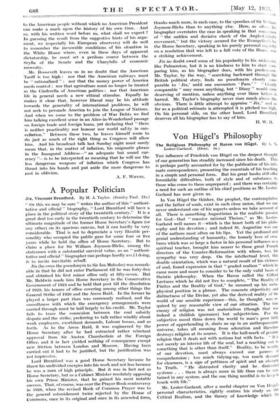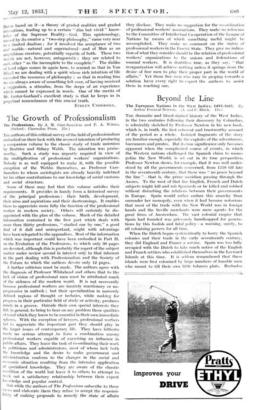Von Hiigel's Philosophy
TIIE influence of Friedrich von Hugel on the deepest thought of our generation has steadily increased since his death. This is perhaps partly accounted for by the publication of his inti- mate correspondence, presenting the essentials of his teaching in a simple and personal form. But his great books still offer formidable difficulties, both of style and of substance, to those who come to them unprepared ; and there was certainly a need for such an outline of his chief positions as Mr. Lester- Garland has now given us.
In Von Hugel the thinker, the prophet, the contemplative and the father of souls; exist in such close union, that we can never understand one of his aspects unless we take account of all. There is something Augustinian in the realistic passion for God—that "massive rational Theism," as Mr. Lester. Garland well names it—which is the heart both of his ph& sophy and his devotion ; and indeed St. Augustine was one of the authors most often on his lips. Yet the profound and genial understanding of humanity, the homely love of crea- tures which was so large a factor in his personal influence as a spiritual teacher, brought him nearer to those great French directors of the Counter-Reformation with whom, too, his sympathy was very deep. On the intellectual level, this double orientation, which was a natural result of his richness of soul, found expression in that "graded realism" which he came more and more to consider to be the only valid basis of theistic philosophy. When the Baron called the Gifford Lectures which he did not live to complete, "The Reality of Finites and the Reality of God," he summed up his meta- physical position in a phrase. The concrete objectivity and distinctness of the Divine, yet also the derived reality of the world of our sensible experience—this, he thought, was re- quired by any reasonable view of our situation. The true enemy of religion was not materialism (though that was indeed a childish ignorance) but subjectivism. For the subjective mood thins down the world to man's poor little power of apprehending it, shuts us up in an anthropocentric universe, takes all meaning from adoration and therefore destroys religion at its source. It is the hall-mark of genuine
religion that it deals not with notions but with facts. It is not merely an interior life of the soul, but a reaching out to something that is other than itself." Reality, to be worthy of our devotion, must always exceed our powers of comprehension; too much tidying-up, too much demand for clearness, is a sign of pettiness of spirit and an obstacle to Truth. "He distrusted clarity and he distrusted systems. . . there is always more in life than can be con- tained in any system, and the one thing needful-is to keep in touch with life."
Mr. Lester-Garland, after a useful chapter on Von Hiigeri personal characteristics, rightly, centres his study on this 'Critical Realism, and the theory of knowledge which the
Baron based on it—A theory of- graded realities and graded intimations, leading up to a certain "dim but vivid" know- ledge of the Supreme Reality—God. This epistemology, named by its creator a "two-step philosophy," came very near to a limited dualism ; for it involved the acceptance of two reel worlds—natural and supernatural—and of Man as an amphibious creature, potentially capable of both. These two worlds are not, however, antagonistic ; they are related to each other "as the incomplete to the complete." The dislike of hard edges comes in again here, to remind us that in Von Hiigel we are dealing with a spirit whose rich intuition of life exceeded the resources of philosophy ; so that in reading him we are always aware of something left over, of having received a suggestion, a stimulus, from the deeps of an experience which cannot be expressed in words. One of the merits of Mr. Lester-Garland's excellent study is that he keeps us in perpetual remembrance of this crucial truth.
EVELYN UNDERHILL.

































 Previous page
Previous page